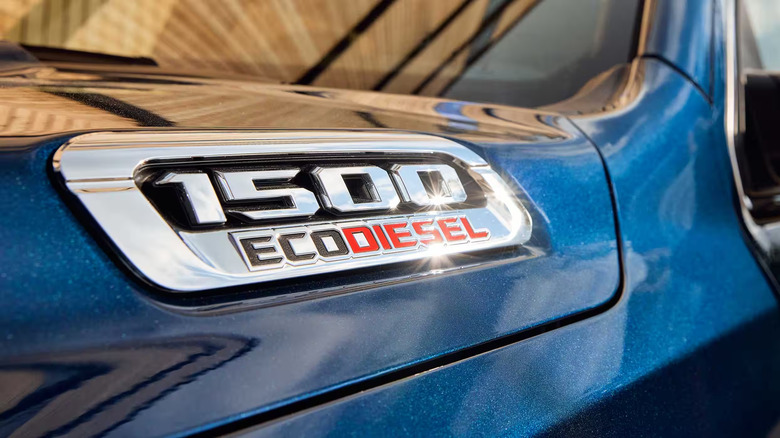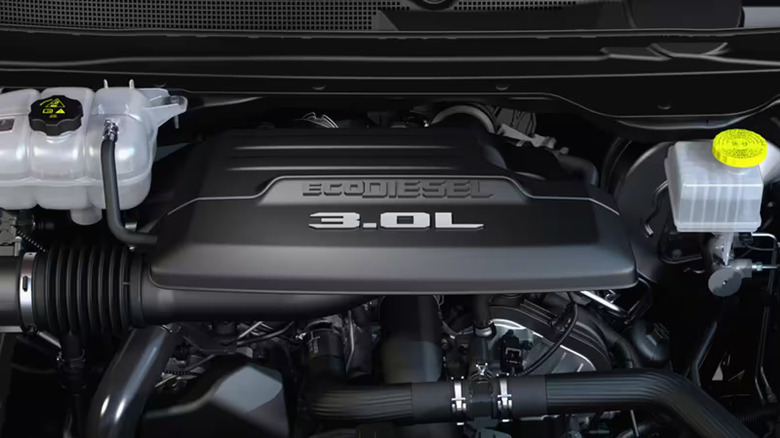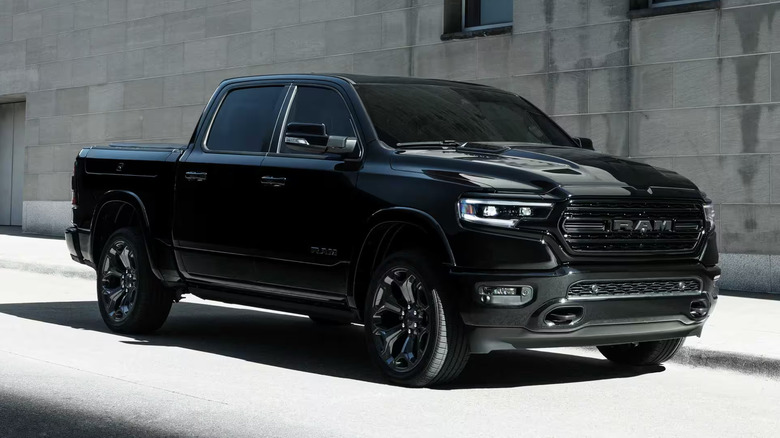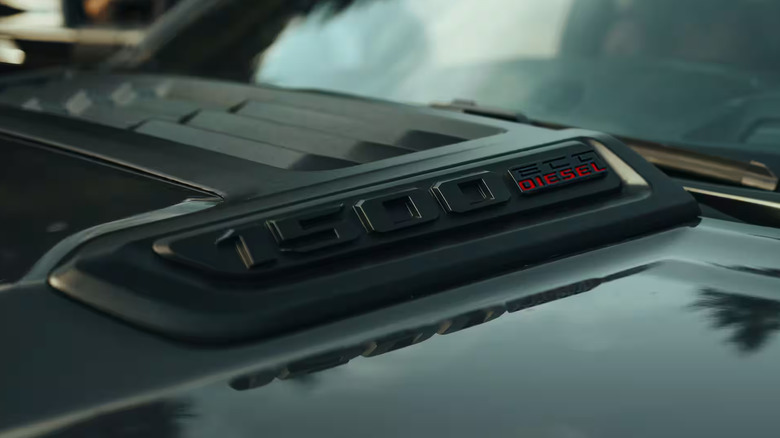EcoDiesel Engines: What Makes Them Special, And Are They Any Good?
If you are someone who was looking to purchase a full-size pickup truck, you may be slightly dismayed at some of the fuel efficiency numbers in the available options. For example, take the 2025 RAM 1500 pickup. If you were to get this truck, the company estimates that the four-wheel drive iteration of the Tradesman model would get 19 mpg in the city and 24 mpg on the highway. This comes with a 3.6L Pentastar V6 engine that uses regular unleaded gasoline for fuel. There are two other engines available for the RAM 1500, and the premium fueled High-Output 3.0L Hurricane I6 will get you just 15 mpg in the city and 21 mpg on the highway in addition to its 540 hp.
Until 2023, RAM had another option for the 1500 that didn't use regular unleaded or premium gasoline. It used diesel, and this engine was the 3.0L EcoDiesel V6. Not only could this engine be found in the RAM 1500 along with larger Jeep vehicles like the Grand Cherokee and Wrangler, it was able to improve those mileage numbers pretty decently, estimating 21 mpg in the city and 29 mpg on the highway. Diesel engines are somewhat of a tricky proposition in the United States, but if this particular engine could get better mileage than the gasoline-powered ones still available today, why would it get discontinued? Well, it has more to do with the future than the positives about the EcoDiesel engine.
The pros and cons of EcoDiesel
No matter what engine you are looking at, it does some things well and others less well. The EcoDiesel V6 engine is no exception. The biggest selling point was its aforementioned fuel efficiency capabilities. As car companies try to find ways to make their engines less harmful to the environment, making an efficient engine is key. Not only that, but the engine was also able to reduce the amount of nitrogen oxide emitted into the atmosphere by using selective catalytic reduction with diesel exhaust fluid. What this means is that it can take the nitrogen oxide produced and convert it into diatomic nitrogen, water, and carbon dioxide, which is much less harmful for the environment. The "Eco" in the EcoDiesel name actually does mean something.
What you lose with the EcoDiesel is power. While it can generate about 480 lb-ft of torque, making it a wonderful option for towing, you are only going to max out at 260 hp with this engine. That is a significant step-down from the gas-powered engines available for the RAM 1500 that range from 305-540 hp, depending on the model, which have pretty comparable torque abilities themselves.
While diesel fuel is more efficient than traditional gasoline, that is more evident if you are someone taking long trips for hauling. Vehicles like the RAM 1500 and Jeep Wrangler are typically passenger vehicles for short trips, and the efficiency differences between the two aren't as stark. Depending on someone's needs, the cons may be a little too much for them.
The real issues
In the pros and cons section, that assumes that everything about the EcoDiesel engine is running just as it was designed to be. However, there are several issues with the engine itself that showed themselves over the engine's decade in production. Among them was an unreliable oil cooler. For oil to effectively work in an engine, it can't be at higher than optimal temperature. Otherwise, you will run into problems like overheating, along with sped up and increased wear and tear.
There have also been problems with the EcoDiesel's turbocharger, which can cause issues with acceleration, and on the road, not being able to properly accelerate can be quite dangerous if the drivers around you don't realize that. This is made even more apparent when you compound it with the engine's already diminished horsepower capabilities. There have also been instances of exhaust gas leaks that can be quite toxic to those in the vehicle. Plus, you have all the other issues that could face any diesel-powered engine.
While these are problems that can be found in traditional gasoline engines as well, an important thing to remember is that finding a mechanic to fix a diesel engine is more difficult than you might think, as not every mechanic is comfortable or familiar with working on these engines because there are so many fewer of them on the road. You very well could be paying more for them as well, on top of paying more for the engine upon purchase as well.
Why the EcoDiesel is no more
It was announced in 2022 that production of the EcoDiesel engine would cease in 2023. As to the reason why, it was for the purpose of focusing on electric vehicles. Diesel is a more efficient fuel than gasoline, and the EcoDiesel engine made a good number of strides in reducing the engine's environmental impact. However, when you compare those things to an electric vehicle, it can only come up short. Electric vehicles don't run on fossil fuels, so there aren't the same harmful emissions you need to worry about. In terms of efficiency, electric vehicles run on a renewable energy, and that is an inherently more efficient form of power, which is something diesel simply cannot do.
So, if you still want to get an EcoDiesel engine, you are going to have to look at older models of the RAM 1500, Jeep Grand Cherokee, and others, or you can peruse pre-owned offerings as well. This was an engine that had its highs and lows, and ultimately, technology determined it wasn't necessary anymore.



